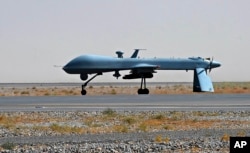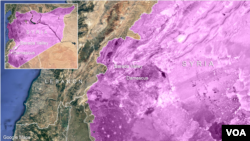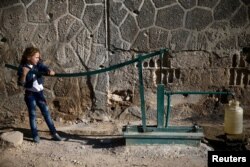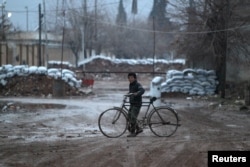Syrian monitors say an airstrike near the Turkish border killed at least three extremist leaders late Sunday, including a commander of a militant faction made up of ethnic Uighurs from far western China.
The Syrian Observatory for Human Rights, which monitors and reports on the country's long-running civil war, said eight people were killed in the attack in northern Idlib province, on a road leading from the town of Sarmada toward the border.
It was not immediately clear who launched the attack, but an observatory report said it was most likely carried out by the U.S.-led coalition battling Islamic State extremists in the region.
The pan-Arab news service Al-Masdar, quoting al-Qaida-linked Fatah al-Sham militants, said the attack came from a U.S. Predator drone. There was no immediate comment from the Pentagon, and that claim has not been otherwise confirmed.
Activist video posted on Twitter purported to show rescuers pulling a body from a wrecked car at the scene.
U.S.-led coalition warplanes and drones have killed some of the region's most senior jihadist commanders since Islamic State extremists declared a caliphate in northern Syria in 2014, after pushing through northern Syria and large swaths of Iraq.
The observatory said the dead in Sunday's strike included al-Qaida commander Khattab al-Qahtani and Abu Omar Turkistani, whose Islamist Uighur force joined with Syrian extremists in a push to topple the government of President Bashar al-Assad.
Earlier airstrikes
Earlier Monday, Turkey's military said its warplanes killed at least 22 militants near its border with northern Syria, and said Russian aircraft destroyed IS targets near the extremist-controlled northern town of al-Bab.
Turkey launched its so-called "Euphrates Shield" offensive on August 24, just hours after an IS terror strike on a wedding party in the southern Turkish city of Gaziantep killed more than 50 people and wounded scores of others. The operation's stated goal is to clear the Syria-Turkey frontier of IS fighters and Kurdish forces by backing the so-called Free Syrian Army with warplanes and artillery.
Exceptions to cease-fire
A Syrian cease-fire brokered last week by Syria, Russia and Turkey excluded extremist targets in the war-ravaged country, including rebel-held territory on the outskirts of Damascus in the fertile Barada valley.
Government forces pounded the area for the past four days, in an attempt to dislodge rebel groups said to include al-Qaida-linked fighters. The onslaught forced hundreds of civilians from the area.
The valley's Barada river is the primary source of water for Damascus and its surrounding area, and the new fighting is said to coincide with severe water shortages in the capital first reported December 22. The government has accused rebels of contaminating water supplies with diesel fuel, forcing severe rationing in Damascus and heightening a sense of urgency by the government to clear the region of rebel forces.
For their part, rebel groups dug in at Barada since 2012 linked the contamination to government airstrikes they claim heavily damaged a key water-processing facility that supplies the city.
The truce agreement that took effect Friday is the first cease-fire initiative in the Syrian civil war that does not involve the United States or the United Nations.
The deal came two weeks after Syria and its Russian allies declared victory in the northern city of Aleppo, after a monthslong air offensive that saw Russian and Syrian warplanes destroy the rebel-fortified eastern sector of the city. In the last days of the rebel occupation, Russia-backed Syrian ground forces pushed through the sector, cutting it in half and forcing rebels out.
Analysts say the victory strengthened the Syrian president's hand as warring parties in the multi-sided conflict prepare for peace talks in late January in the Kazakh capital Astana.









